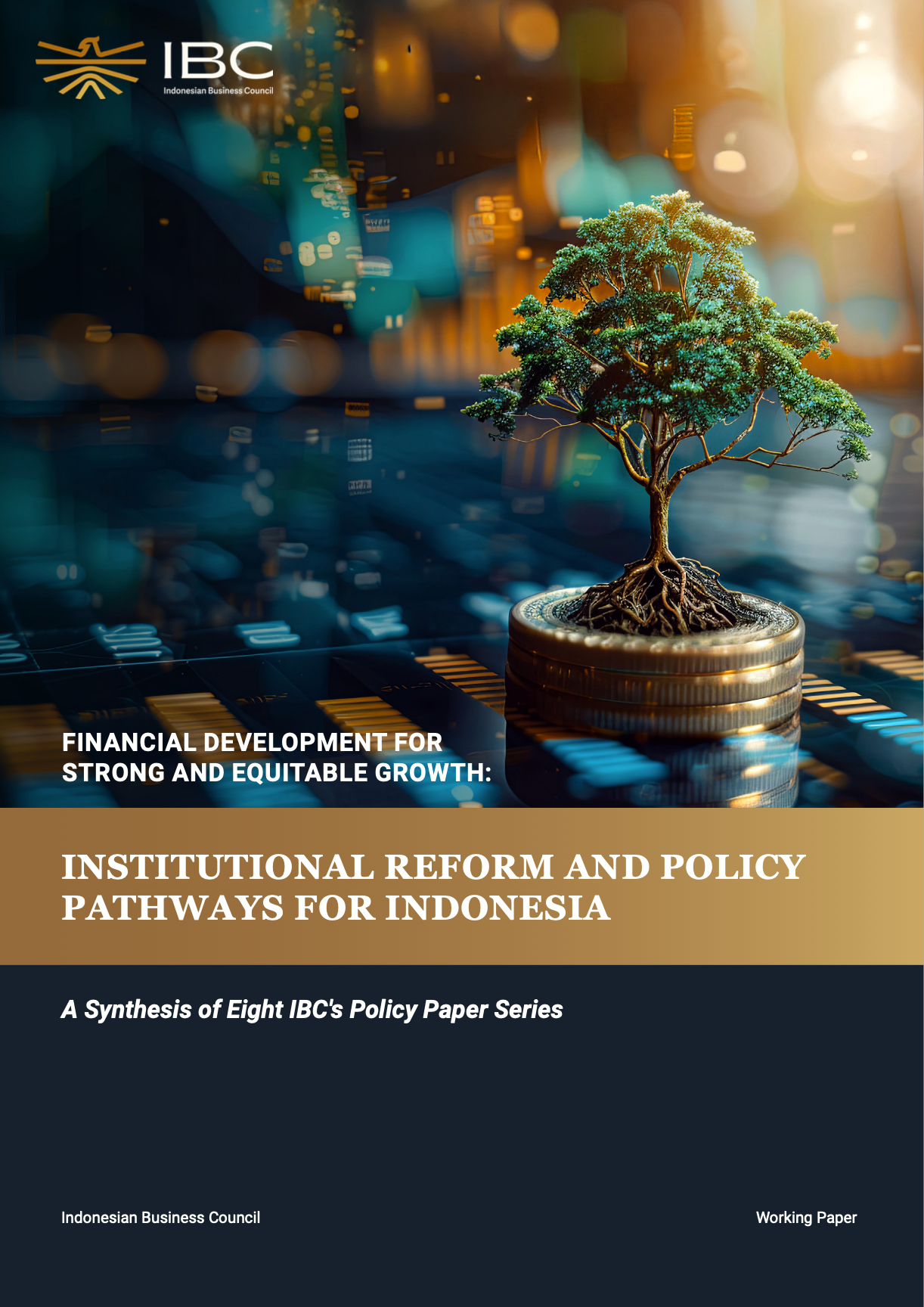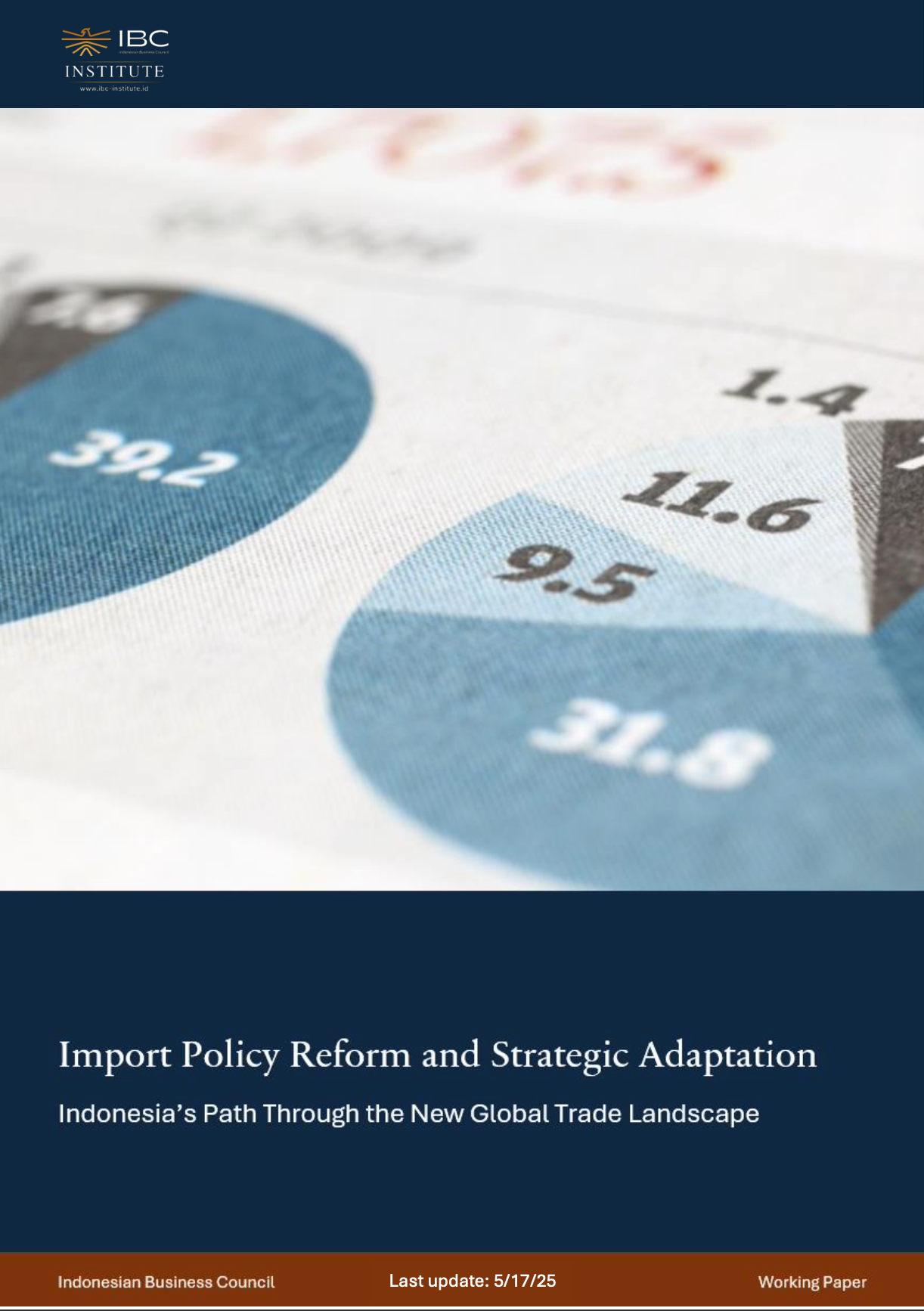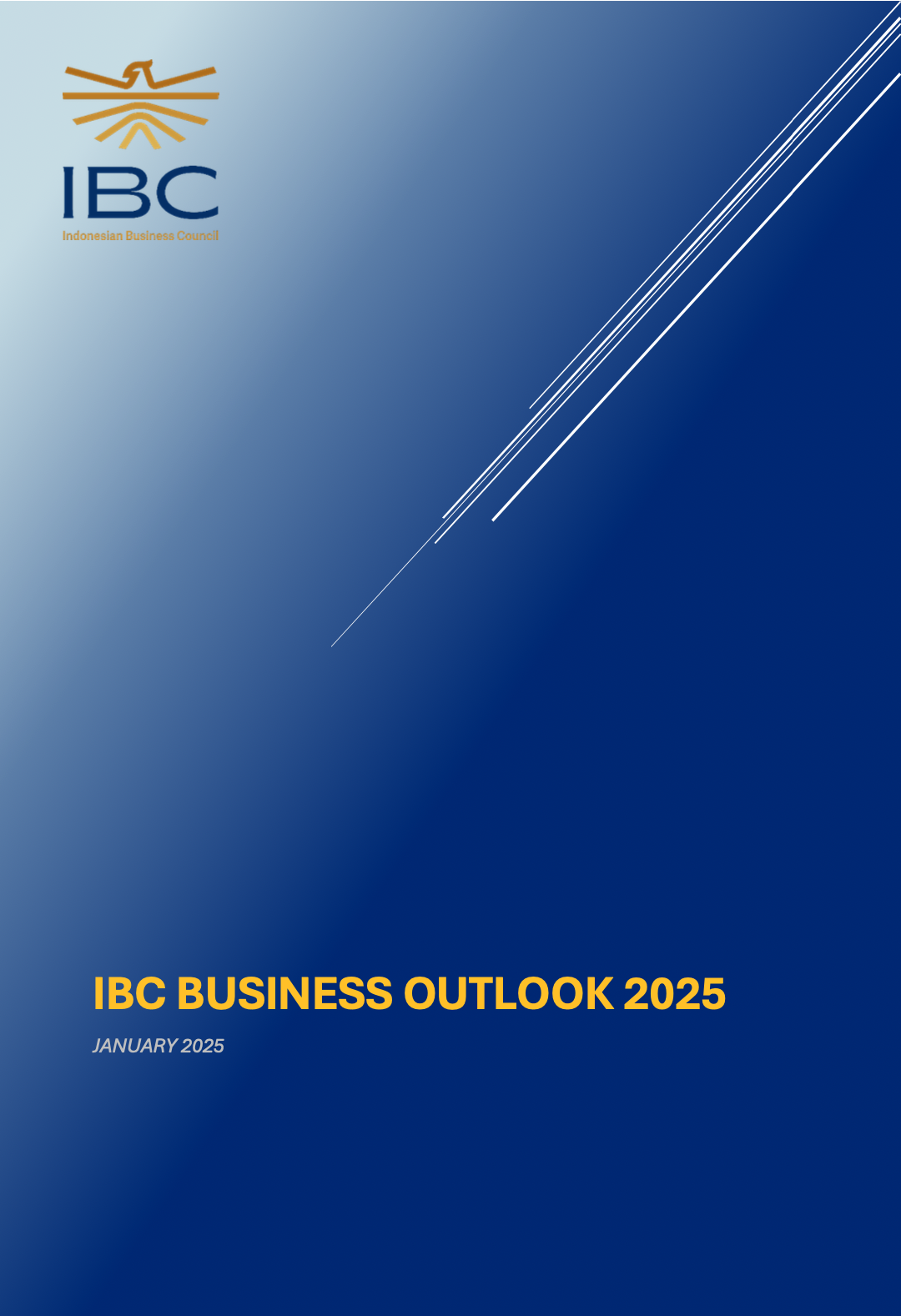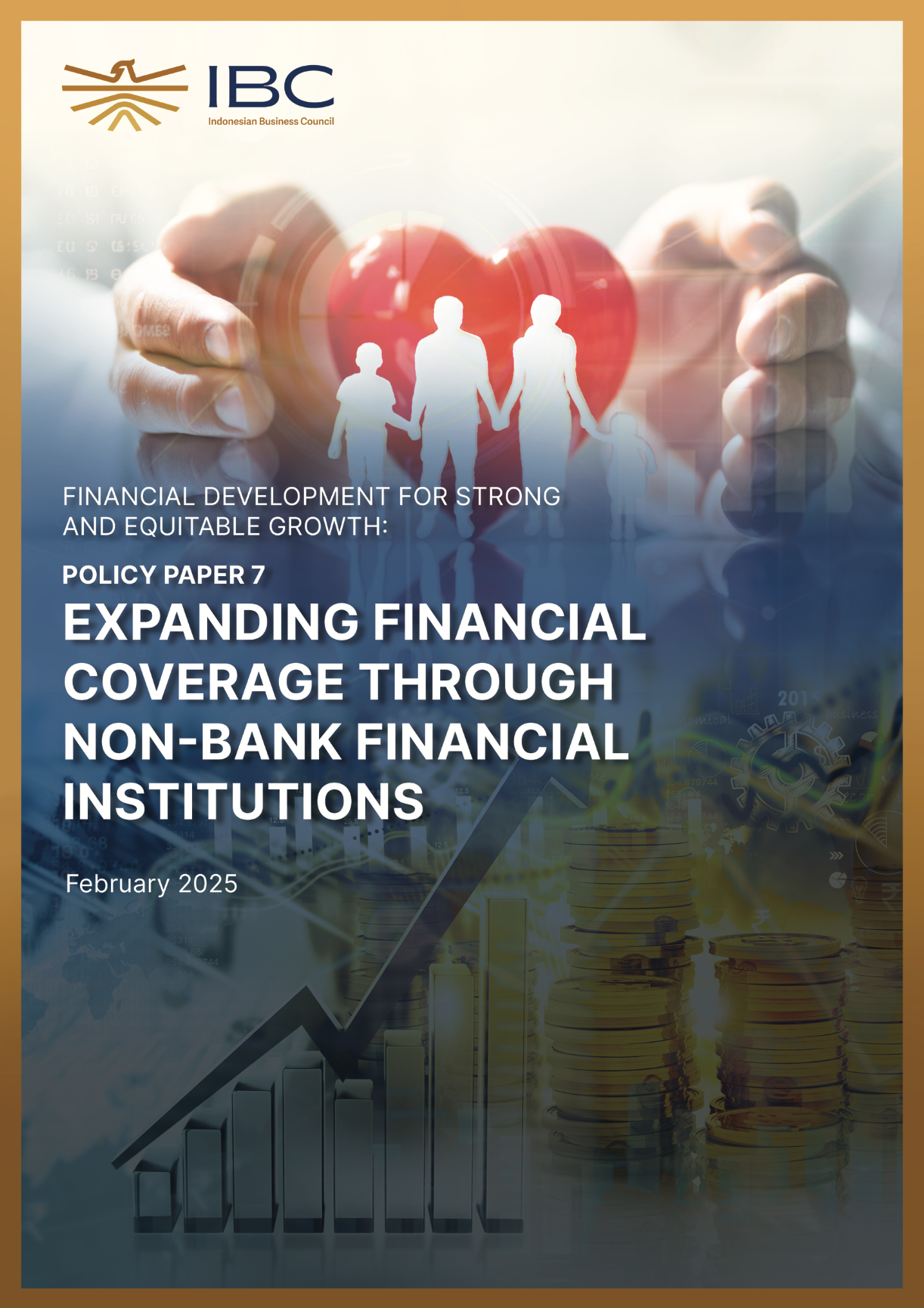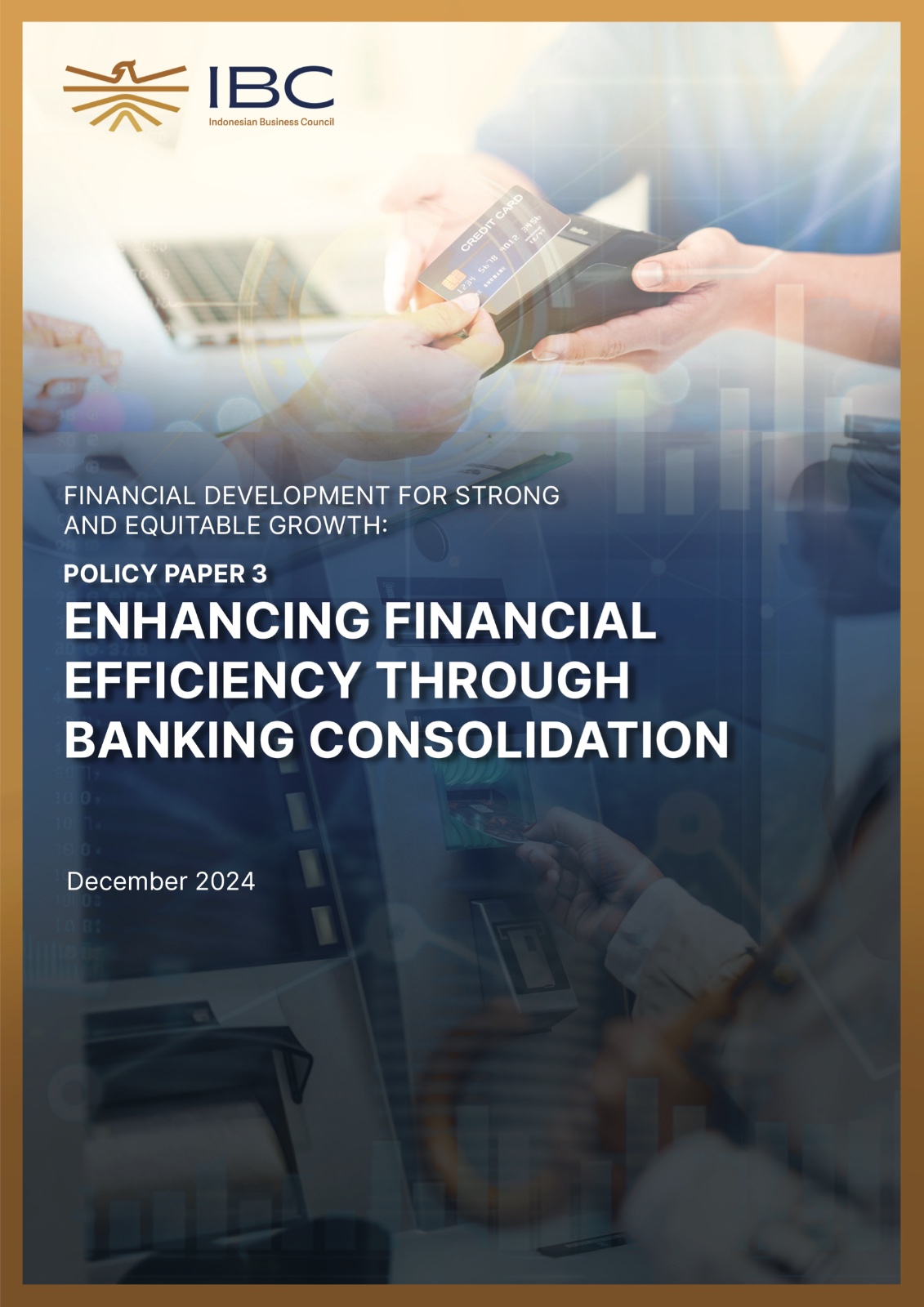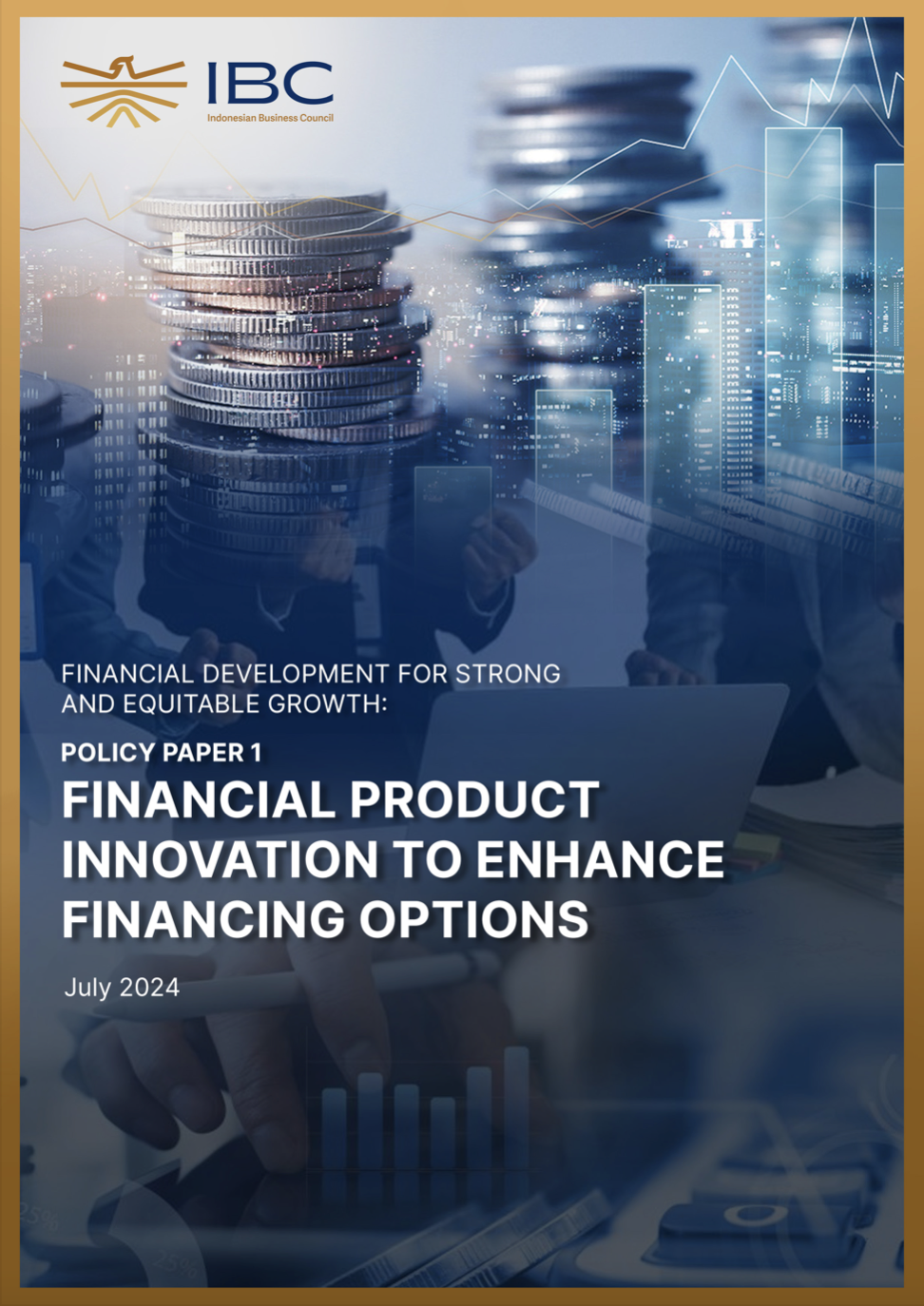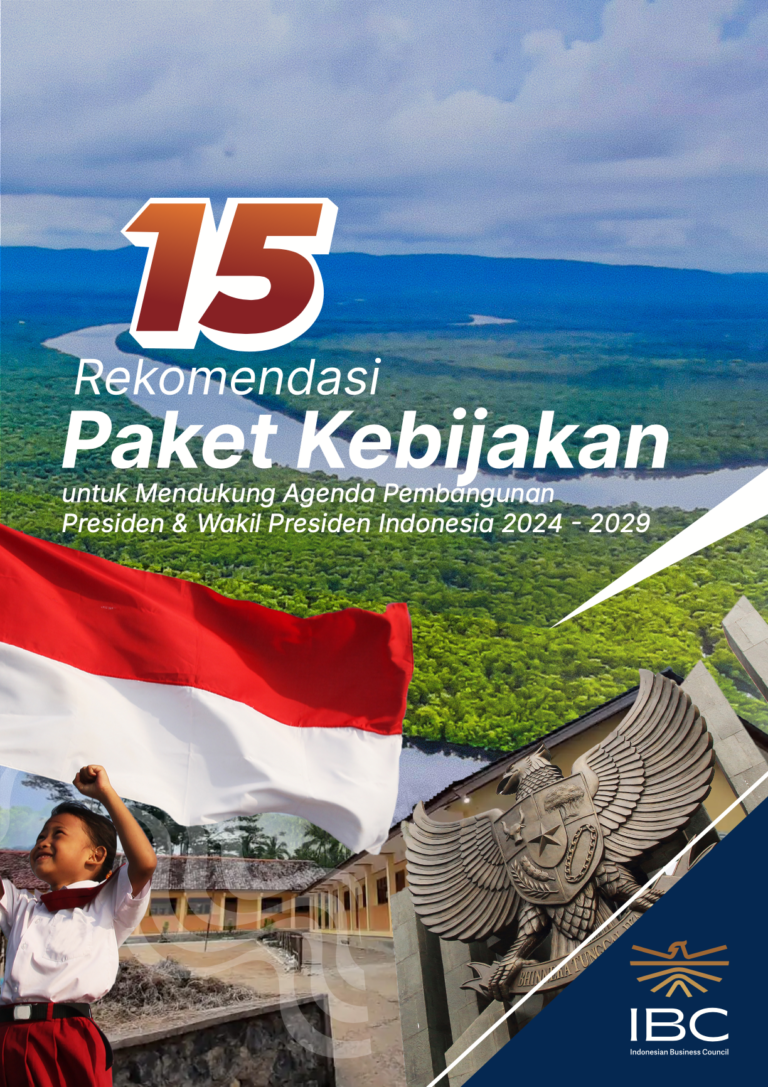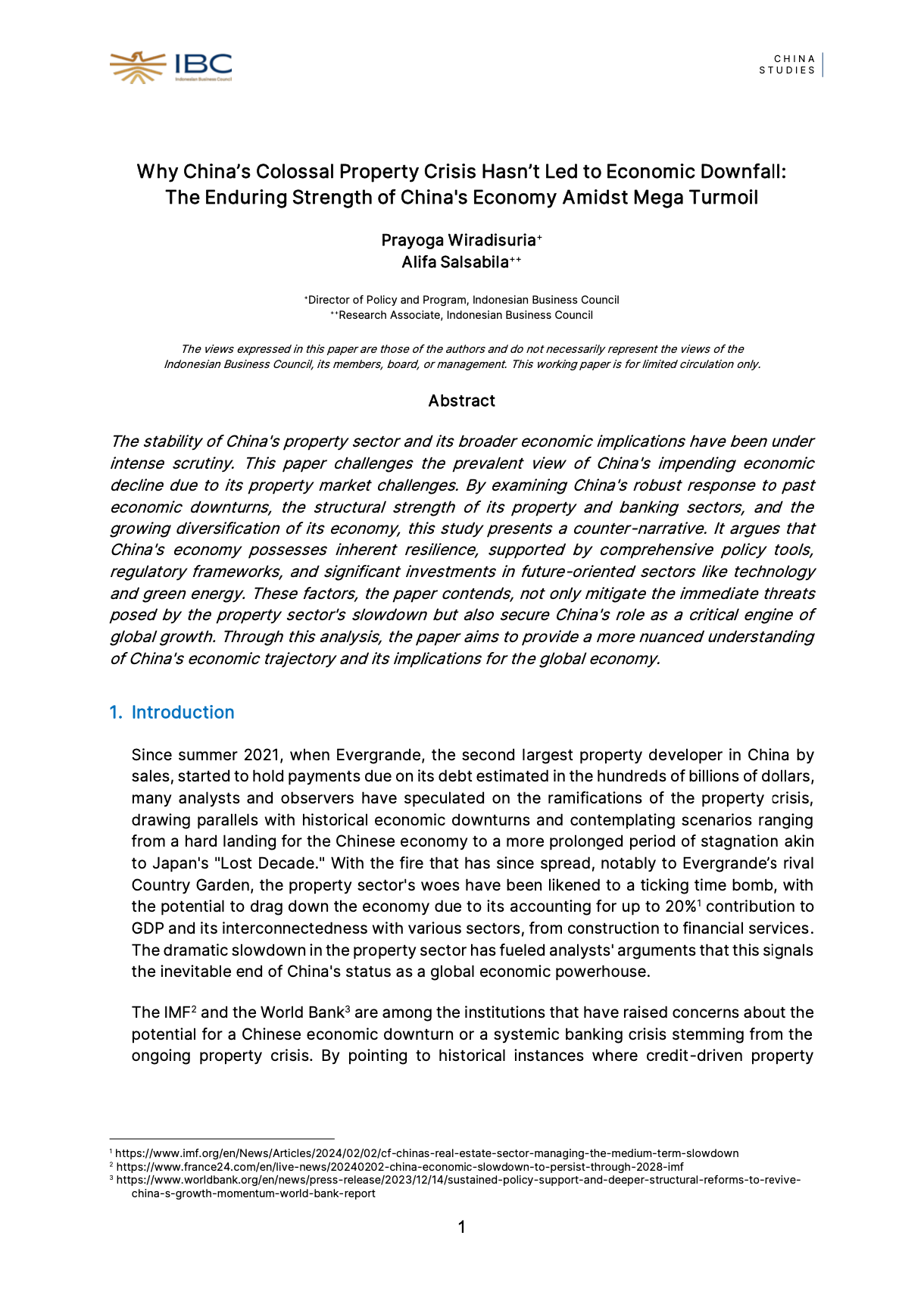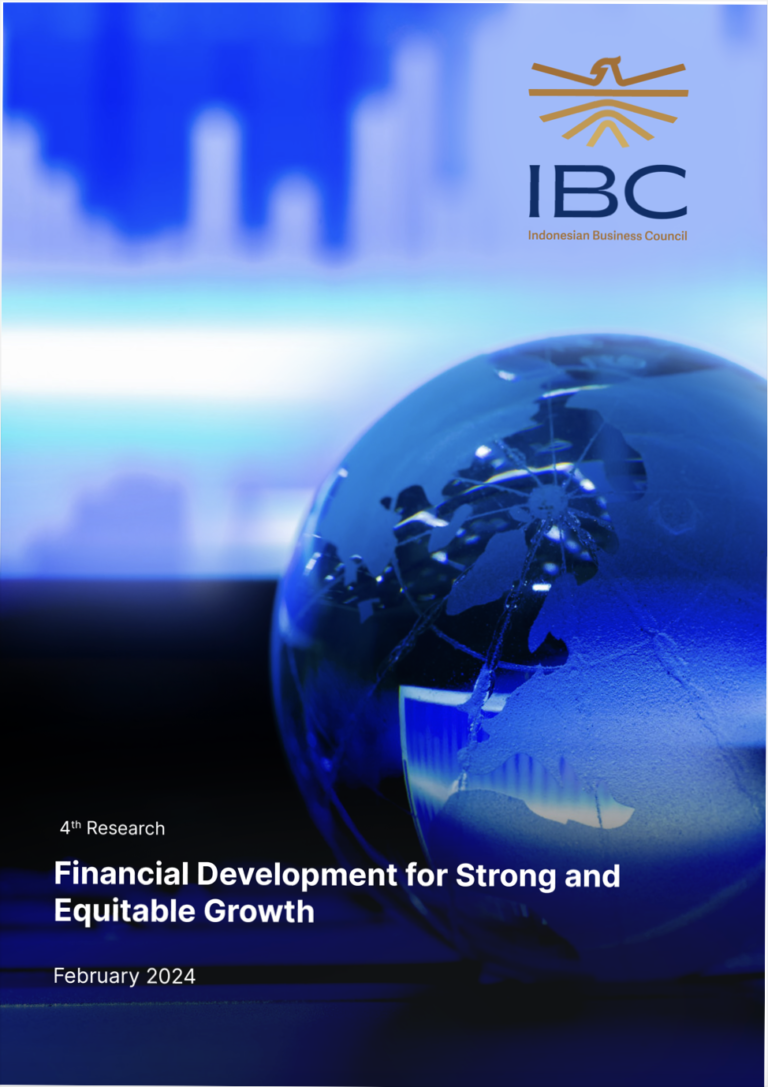Indonesia’s financial sector remains underdeveloped, marked by low liquidity, limited access, and high borrowing costs. This flagship policy paper by the Indonesian Business Council (IBC) outlines a roadmap to address these challenges through institutional realignment and strategic policy reform. Key recommendations include: (i) strengthening the Ministry of Finance’s role in financial sector development, (ii) refocusing OJK on consumer protection and market conduct, (iii) consolidating prudential oversight under Bank Indonesia, and (iv) introducing a unified national financial roadmap. To support depth, access, and efficiency, the paper also promotes the use of municipal bonds, REITs, digital finance tools for MSMEs, and improved credit rating systems. These reforms aim to build a more inclusive, resilient, and growth-oriented financial ecosystem.
IBC Papers
Abstract
Abstract
Indonesia’s trade policy is facing renewed scrutiny amid global economic pressures, particularly following the proposed 32% U.S. tariff on key Indonesian exports such as electronics, furniture, apparel, and rubber. In response, Indonesia has offered to increase imports from the U.S. by up to $19 billion in a short-term diplomatic effort to rebalance bilateral trade. However, this gesture highlights deeper structural vulnerabilities, especially in the absence of Generalized System of Preferences (GSP) status since 2020. This policy paper underscores the need for a comprehensive reform of Indonesia’s import regime, aligning it with national development agendas like RIPIN, RPJMN 2025–2029, and the President’s Asta Cita, to enhance industrial competitiveness, ensure access to affordable inputs, and support a sustainable trade balance.
The paper presents a three-pronged strategy: Response, focusing on immediate diplomatic and domestic actions; Reform, targeting systemic improvements in tariffs, customs, and sector-specific regulations; and Rebound, leveraging trade risks into long-term gains through deeper regional integration and investment-led growth. Drawing from consultations with the Indonesian Business Council (IBC), the recommendations advocate for a differentiated, sector-based approach to import governance that balances economic resilience with global market integration.
Abstract
Indonesia enters 2025 in the middle of a cross-fire, facing an increasingly complex economic landscape shaped by both global disruptions and domestic challenges. The nation’s ability to navigate shifting geopolitical dynamics, trade realignments, and technological advancements while addressing structural inefficiencies at home will determine its economic trajectory. The IBC Business Outlook 2025 provides an analysis of these key forces, offering insights to equip businesses and policymakers with the foresight needed to adapt, innovate, and drive sustainable growth.
Abstract
The potential of green financing in Indonesia remains underutilized, as reflected in the Global Green Finance Index, where Indonesia ranks lower than other ASEAN countries. Insufficient financial depth could be addressed through green financing; however, its implementation faces several challenges. Key obstacles include a lack of interest in green financing, high levels of non-renewable energy financing; particularly coal, limited availability of green financial instruments, concerns over greenwashing, and suboptimal energy resource management. To overcome these challenges, the paper recommends: (i) promoting the concept of inclusive green finance, (ii) mandating financial institutions and public companies to invest in green financial instruments, (iii) developing a blended finance scheme, (iv) advancing green securitization, (v) ensuring guarantees for green projects to confirm that funds are allocated to eco-friendly activities, and (vi) enhancing the adoption of renewable energy, including the development of battery technology, solar power, and the electric vehicle (EV) industry.
Abstract
Indonesia’s NBFI sector is significantly smaller than those in both advanced and emerging economies. The insurance and pension fund sectors remain underdeveloped, limiting their role in supporting economic growth. Even emerging markets surpass Indonesia in these areas, further hampering financial deepening, restricting long-term investment opportunities, and weakening overall financial sector resilience. Key challenges include governance issues in pension funds and insurance companies, limited regulatory authority and enforcement mechanisms, low product penetration, and early withdrawals that undermine pension fund longevity. To address these issues, this paper recommends: (i) strengthening governance and asset management principles, (ii) refining OJK’s mandate to enforce stricter penalties for delays and enhance consumer protection, (iii) expanding participation in these financial products across both formal and informal sectors, (iv) implementing stricter withdrawal policies to promote long-term investments, and (v) improving the JHT program.
Abstract
The NPL market in Indonesia remains underdeveloped, and resolving insolvency is both time-consuming and costly. Key challenges include the underdevelopment of the secondary market, the absence of valuation and transfer price standards, lack of institutional design and certainty in AMC operations, limited regulatory mandate for PPA, and inadequate competency in risk and NPL management. To address these issues, this paper recommends: (i) developing a secondary market, (ii) establishing a standardized framework for AMC operations, (iii) strengthening commitment to NPL resolution, (iv) clarifying PPA’s mandate and enhancing coordination across relevant institutions, (v) expanding PPA’s mandate to manage private sector assets, and (vi) improving professional development in AMC.
Abstract
The imbalance in tax treatment between the financial and non-financial sectors creates distortions in competition, hindering financial development. Indonesia’s tax expenditure is substantial, with the financial sector accounting for a significant share. Meanwhile, the country has one of the lowest tax-to-GDP ratios in Asia, highlighting the need for a comprehensive review. Key challenges include suboptimal VAT exemptions across several sectors, an inequitable income tax burden, and ineffective land sales taxation. To address these issues, this paper recommends: (i) expanding VAT exemptions for financial services, (ii) implementing a progressive income tax on savings, deposit interest, and stock trading, and (iii) introducing a progressive tax on land sales.
Abstract
Indonesia has grappled with maintaining stable credit ratings, often lagging behind its Southeast Asian neighbors. Key factors influencing sovereign ratings include macroeconomic stability, fiscal policies, government debt, and economic performance. However, Indonesia’s dependence on commodities, low tax revenues, regulatory uncertainty, corruption, twin deficits, and shallow financial depth pose significant challenges. To improve its sovereign rating, Indonesia must (i) diversify its economy, (ii) enhance tax collection, (iii) ensure a healthy balance of payments, (iv) strengthen legal transparency, and (v) Maintain effective communication with rating agencies.
Abstract
Indonesia’s banking sector is vital to the economy but struggles with efficiency issues, such as high interest rates, increased competition from digital advancements, inadequate capital, and non-performing loans. Recent financial sector reforms aim to address these issues by promoting bank consolidation to enhance stability and efficiency. This study highlights that tailored consolidation strategies are essential for Indonesia. Key recommendations include (i) offering tax incentives, (ii) simplifying regulations, (iii) providing capital support, (iv) enforcing antitrust laws, and (v) fostering bank culture integration.
Abstract
Indonesia’s MSMEs face significant barriers to accessing credit, primarily due to the “missing middle” phenomenon, where they are too large for microfinance but too small and risky for formal financial institutions. Key issues include reliance on traditional collateral, insufficient and fragmented credit information systems, poor credit ratings due to rigid assessments, and low financial and digital literacy among MSMEs. To address these challenges, the paper recommends (i) diversifying collateral assets, such as movable property and intellectual property, (ii) enhancing credit information systems, (iii) improving the credit rating system, and (iv) increasing financial and digital literacy.
Abstract
Indonesia ranks among the lowest in ASEAN in terms of broad money (M2) to GDP ratio, indicating the shallowness of its financial sector. Key challenges include over reliance on traditional funding sources, insufficient regional financial capacity for public services, unmonetized property assets, and inadequate financing for Micro, Small, Medium Entreprises (MSMEs). To address these issues, innovative financial products are critical: (i) Project Finance Bonds for long-term infrastructure projects, (ii) municipal bonds to fund regional development, (iii) Real Estate Investment Trusts (REITs) to unlock property value; and (iv) partial guarantee schemes to expand support for MSMEs.
Abstract
To support the leadership of President Prabowo Subianto and Vice President Gibran Rakabuming Raka, IBC proudly presents the white paper titled “15 Policy Package Recommendations to Support the Development Agenda of the President and Vice President of Indonesia 2024 – 2029.” This document maps out challenges across various focus areas and offers strategic policy package recommendations to support delivering 8 Asta Cita Missions, 8 Best Results Programs Fast, 17 Priority Programs, as well as other work programs.
The 15 policy package recommendations are based on the national management framework for a Competitive and Prosperous Indonesia. This framework consists of four main pillars: Economy, Human Resources, Governance, and Innovation, specifically formulated through 15 focus areas. These focus areas cover issues such as resource downstreaming, food estate, bureaucracy digitalization, and advanced technology production. Each policy package recommendation is designed in a modular fashion, allowing readers to select the parts most relevant to their interests and fields independently.
Abstract
This paper challenges the view of China’s impending economic decline due to property market issues. By examining its past crisis responses, robust property and banking sectors, and economic diversification, it highlights China’s resilience. Supported by strong policies, regulatory frameworks, and investments in technology and green energy, China mitigates property sector risks while maintaining its role as a global growth engine. The study offers a nuanced perspective on China’s economic trajectory and global impact.
Abstract
The Indonesian Business Council (IBC) embarked on a comprehensive research study to identify strategic policy recommendations aimed at enhancing financial access, inclusivity, and competitiveness in Indonesia’s financial sector. The overarching goal of this research initiative was to bolster the efficiency and stability of Indonesia’s financial landscape, thereby fostering sustainable economic growth and development. The research encompassed seven key policy areas that were deemed essential for improving financial development in Indonesia such as financial product innovations, tax reforms, advancement of non-bank institutions, enhancement of credit information and collateral regulations, support for bank consolidations, fiscal and macroeconomic management and NPL management improvement through Asset Management Companies (AMCs).
The study underscored the importance of evidence-based policymaking, stakeholder engagement, and empirical studies to refine and implement these policy recommendations effectively. By addressing these structural challenges and implementing the proposed policy measures, Indonesia aims to enhance its financial competitiveness, attract more foreign investments, reduce borrowing costs, and promote sustainable economic growth. This holistic approach is crucial for overcoming the barriers to financial development and advancing Indonesia’s position in the global economic landscape.

